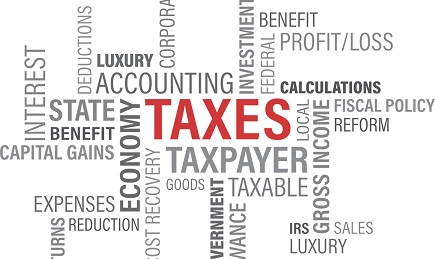The Costs and Sole Financial Benefit of Taxation

Cost and Benefit Analysis of Taxation
There are grave problems in economics – found not within its framework, but rather within the assumptions, postulates, and definitions upon which this framework is erected.
One questionable assumption is that Taxation, the primary tool by which governments fund public enterprise, is a necessity. Many economists and financial thinkers engage in arguments over what should be the proper level and types of taxation imposed upon a nation, state or province, and city. As far as I know, none has ever forged a proof or even a crude analysis of the necessity or superiority of Taxation for funding public enterprise. With the researchers and money available this deficiency in public finance seems strange.
When government offers a service to the public, whatever it be, the country should in some manner benefit. Yet, it is never confirmed that money so industriously earned and carefully accumulated by the citizen and corporation and so mechanically seized by the authorities is ever directed to pursuits that bear calculated, salutary and profitable returns to a nation and its people.
Cost and Benefit analysis is a tool used daily by people to make responsible and prudent financial decisions. There are always costs in the things that one does and there are always benefits. In every decision, a person labours at making benefits exceed costs. Simply put, if the fully examined and accounted cost of performing some action X is greater than the benefit of performing X, would any rational person execute X?
Within public finance there is meager cost and benefit analysis. There is some accounting of the financial costs of public endeavours, often vague and erroneous and usually bearing many an upward adjustment. However, there really has never been an honest and clear accounting of the financial benefits of public enterprise beyond partial and emphatic declarations of broad bounty.
If government were to adhere to sound accounting principles much in the way the citizen and corporation do, it is certain that a great many efforts presently funded by the nation would cease or undergo reformation.
If government applied general Cost and Benefit Analysis to its measures and activities to ascertain worth and profit, then it may also apply it to Taxation, the primary means of raising funds for public investment.
With Cost and Benefit analysis completed, the decision to abolish or retain Taxation will become clear. If the financial benefits of Taxation exceed costs, then the state should retain it. If not, if the costs exceed benefits, then it should be abolished and a better method of procurement of public funds sought and employed.
In Taxation the government or designated agent confiscates the property and money of others to pay for assorted public goods and services. The costs of this instrument in collection, enforcement, evasion, and deterrence are immense, and a complete enumeration would require volumes. Essentially, Taxation is a deterrent. It deters anyone from working, purchasing, saving, or investing as much as he might were there no Taxation. Taxes retard economic activity, and oppressive taxes cripple it. Taxation also ensures confiscated funds bear no capital charge. The government, thereby, is released from the benign burden of having to justify desired undertakings; of ensuring an effort is worthy of consideration and implementation, competitive with other projects, or profitable by some measure. The money arrives, and it is spent, well or ill.
Very few persons realize the breadth and depth of Taxation’s destructive effect upon the wealth of the nation, its citizens, and corporations. And the most ruinous costs invariably derive from the effect of deterrence and of the lack of a capital charge upon public expenditures.
Briefly, a few costs are:
(1) Unjustified expenditure of revenues creating unprecedented waste, corruption, and squander.
(2) Discouragement of and constraint upon industry, labour, and productivity. Worthy economic activity is greatly curtailed or squelched.
(3) Increasing imposition which compels tax evasion and complex and costly avoidance, leaving greater exaction for the remainding taxpayers.
(4) The impulse to migrate or convey assets and capital beyond the borders to less burdensome tax districts and nations.
(5) An immense, absurdly complex, inequitable, biased, and costly apparatus needed by government to collect taxes and needed by the individual and business to pay taxes.
(6) The vast abuse of public resources, goods, and services with near impunity.
(7) Unnecessarily heavy, disruptive, and bureaucratic regulation.
(8) The maintenance of monopolies and prized relationships that cost public greatly without accounted benefit such as agricultural programs and telecommunication regulations.
To add up the costs of taxation would be a difficult exercise requiring much time and laborious effort. It may be easier to assess the benefits of taxation and then proceed.
Therefore, what are the benefits of Taxation or the payoff that dwarfs all costs?
For an answer, one may look to a commonplace example: the purchase of a home.
To buy a $100,000 home, one may use their savings or like most borrow.
If the buyer pays with savings, his personal funds decline by $100,000, and he obtains title to his new home.
If the buyer borrows, his financial debts rise by $100,000, he obtains title to the home, and he is obligated to pay interest on that loan.
The only difference to be found among the two cases is that the borrower must pay interest on the loaned funds. Thus, the financial benefit to the buyer of using his own money to purchase the home is the interest he need not pay on money he chose not to borrow, or in short : Interest Savings.
Some may argue that the borrower must also repay the principle. This is correct, but it does not alter the resulting benefit. The cost to the borrower would be the amount of principle paid down, and the benefit would again be the consequent savings in interest.
I do realize the acquisition of a home augments the buyer’s assets. As the addition will be the same in both cases and will not affect the result I chose to omit it.
With this in mind, we turn to the benefit of Taxation.
Suppose the nation requires $100,000 for some venture. It can tax or borrow to secure the funds.
By taxing, the combined financial assets of the nation’s citizens decline by $100,000, and the nation acquires its vital service.
By borrowing, the nation’s debt rises by $100,000, it obtains its needed service, and it must pay interest on the loan.
So what is the benefit of the nation using its own funds, or taxing?
As with the homeowner, the only item of difference between the two is the savings in interest that the nation need not pay on money it chose not to borrow. Interest Savings is the benefit – the sole benefit – of Taxation.
I excluded the value of the goods obtained by Government and the funds paid out in expenditures from the example as it applies equally to both cases.
Some may suggest that in Borrowing a nation must repay the principle. This is true. However, it is not required if the lender is satisfied with the security of the loan and he receives market interest rates upon the advanced funds. If he is not satisfied and insists upon repayment, then another lender may be engaged to reimburse the initial lender. If none can be found, then the government must tax the nation and lessen its indebtedness. Yet, the benefit of Taxation remains the same. If the nation taxes instead of borrows its funds for public enterprise, it saves on the capital or interest charges, presently 5 or 6 cents on the dollar.
Another point on the same question concerns the costs and benefits of repayment. A borrower will only repay a loan when a cost and benefit examination abets it. If the benefits of repayment surpass costs, a borrower is prudent to erase the obligation. However, if costs of repayment exceed benefits, it would be unwise to rescind the debt.
If a person earns 10% on some investment and also has a debt in the same amount with a charge of 5%. With elevated returns, it is not in his interest to squelch the debt at the expense of the investment.
Having circumscribed the benefit of Taxation, let us manipulate the result.
If the government borrows $10,000 from only resident citizens for some project, the nation’s debt rises by $10,000.
And by how much do the nation’s financial assets rise?
As the resident lenders now hold an IOU for the $10,000 loaned, an amount that would have been confiscated under Taxation, it rises by exactly the same amount or $10,000.
And what would happen were the government to borrow $100 to pay interest to its resident bondholders?
The national debt would rise by a further $100. But then so would the financial assets of the bondholders, and hence the nation.
Thus, the rise in the nation’s financial debt is perfectly balanced by a rise in its financial assets.
If the government were to borrow every penny it spends from resident citizens as well as the interest, the wealth of the nation would be unaltered in the transaction. A rise in assets would always balance a rise in debts.
I have created an alternate proof employing greater arithmetical and formulaic content. The following explanation should leave little doubt as to the conclusion detailed above.
The costs of borrowing for a nation to fund public expenditures, if it borrows solely from its resident citizens and in the nation’s currency, is nil. If, in adding a financial debt to a community, one adds an equivalent financial asset, the aggregate finances of the community will not in any way be altered. This is simple reasoning confirmed by simple arithmetic.
The community is the source of the government’s funds. The government taxes or borrows from the community to pay for public services provided by the government. Cost of public services is $10 million.
Scenario1: The government taxes $10 million.
Community finances: minus $10 million from community bank accounts for government expenditures. No community government debt, no community government IOU.
Scenario 2: The government borrows $10 million from solely community lenders at a certain interest rate.
Community finances: minus $10 million from community bank accounts for government expenditures. Community government debt: $10 million; Community government bond: $10 million.
At x years in the future: the asset held by the community (lenders) will be $10 million + y interest. The deferred liability claimed against the community (taxpayers) will be $10 million + y interest.
The value of all community government debts when combined with all community government IOUs or bonds is zero for the community.
It is the same $0 combined worth whether the community pays its taxes immediately or never pays them at all.
Thus, if a community borrows from its own citizens to fund worthy public expenditures rather than taxes those citizens, it will not alter the aggregate finances of the community or the wealth of the community any more than Taxation would have. $10 million leaves the accounts of the residents of the community under both Taxation and Borrowing. And adding a financial debt and an equivalent financial asset to a community will cause the elimination of both when summed.
Whatever financial benefit Taxation possesses is nullified by the fact that Borrowing instead of Taxation places no greater financial burden on the community.
Therefore, under the stipulation of only borrowing from residents, Taxation seems to bear no benefit, financial or otherwise. Astounding as it may be, one must conclude that Taxation is all cost and no benefit.



